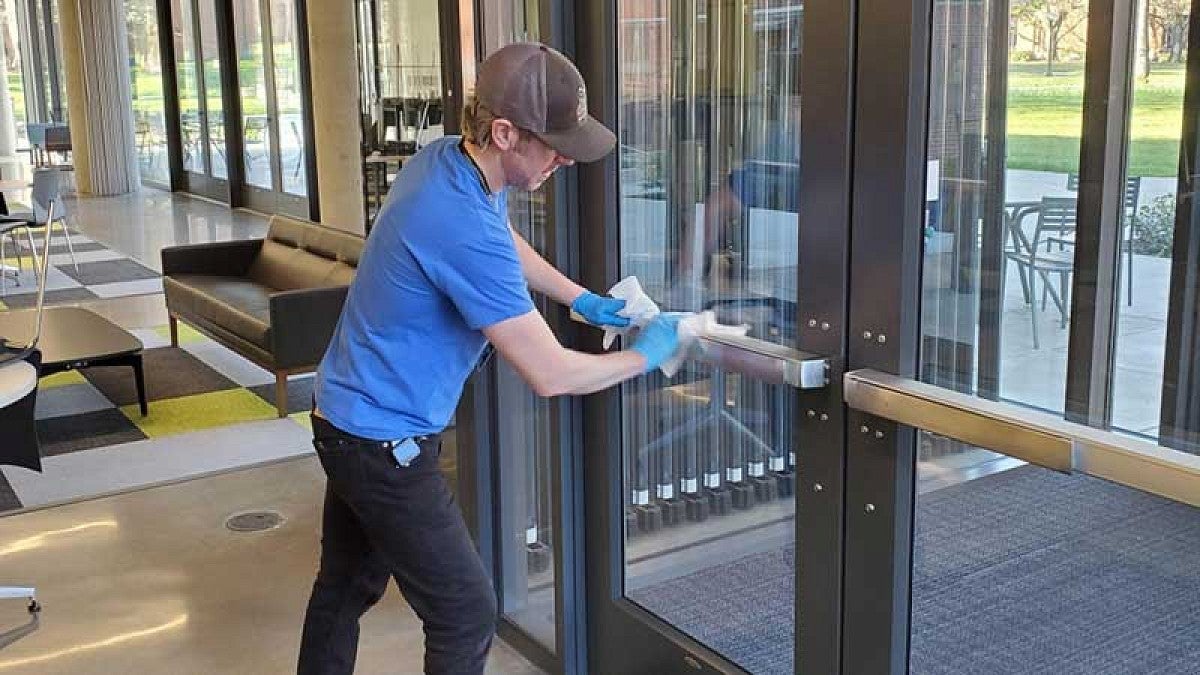In the battle against the invisible enemy, UO Facilities Services’ top allies are Oxivir disinfecting wipes and repetition.
For the past three weeks, custodial employees have disinfected thousands of “high touch points” across the university campus again and again. And again.
“That’s door handles, handrails, drinking fountains, bathroom fixtures, elevator buttons, light switches, help desks and tables in common areas, basically anything you can think of on campus that gets touched a lot,” said Tim Winder, the UO’s custodial services manager.
Staying watchful and detail focused every day is key when fighting the coronavirus that causes COVID-19 and can reportedly live for days on hard surfaces, Winder said.
“These touch points don’t look dirty. In fact, they’re cleaner than they’ve ever been,” he added. “But our crews have done a great job of being vigilant because it’s a situation where just one person touching them could help spread the virus.”
With the campus largely empty since the UO decided to shift to remote teaching because of the pandemic, Facilities Services has honed in on its new disinfection directive, including through a comprehensive “deep clean” of campus classrooms, lecture halls and libraries.
More long-term cleaning projects are also in the works once there’s a better understanding of what areas of campus and buildings will still be used during spring term. Fewer people on campus means cleaning work can be done more efficiently; unoccupied spaces can be cleaned at any time.
“Moving forward, there is an effort to figure out where people will be (during spring term) and focus our efforts on those areas,” Winder said.
Despite some shortages of cleaning supplies across the country, Winder said Facilities Services remains well stocked, having ordered and received a large shipment of Oxivir disinfecting wipes at the start of the outbreak.
Even if there are future issues with suppliers, Winder said he’s planned alternative arrangements that would allow cleaning crews to keep up their work.
Oxivir “is a little stronger than standard disinfecting cleaning products,” he said. “And it’s been effective against previous strains of coronavirus.”
While the work remains similar, the emptier campus environment has felt different for custodial teams, particularly those that are on the day shift.
“Many of our day shift folks moved to that shift so they could have daily interactions with students and staff,” Winder said. “Their purpose at work comes from students and that purpose is absent right now.”
The custodial teams have been practicing social distancing as well, with no more big staff huddles at the start of their shifts and workers doing their cleaning further away from each other.
“It’s a change,” said custodial operations supervisor Nicholas Grant. “Normally we do like to talk and interact with each other more. Social distancing moves us all apart.”
Winder said he’s pleased with the commitment his staff has shown and how they’ve adjusted to their heightened responsibility and visibility during the pandemic. Custodial workers have always provided key sets of eyes and ears on campus, identifying potential problems in buildings. This function is even more important now that UO facilities are no longer seeing much traffic.
“The fact that the majority of our crews are continuing to show up to work during this situation is really a credit to them,” he added.
Spring cleaning at the UO this year is going to be all-out, Grant added. Projects that are more labor-intensive are on his list: cleaning whiteboards and chalkboards, washing carpets and floors, and cleaning the inside of trash cans, to name a few.
“We are going to try to make campus look as good as it’s ever looked for when students come back,” Grant said. “That’s the goal.”
—By Saul Hubbard, University Communications


